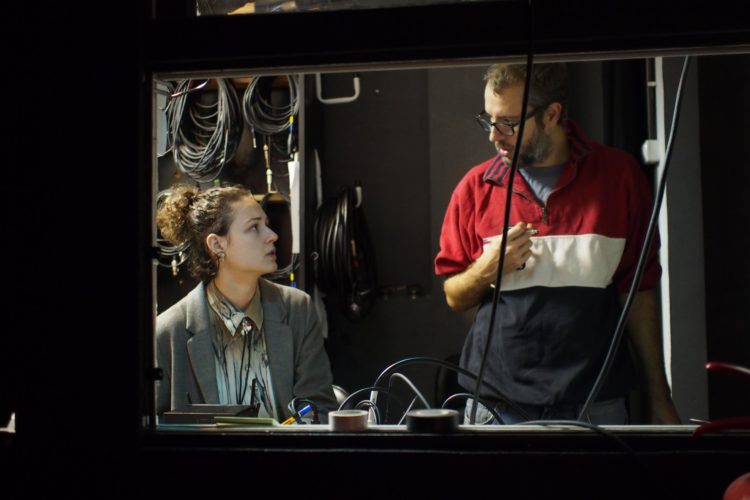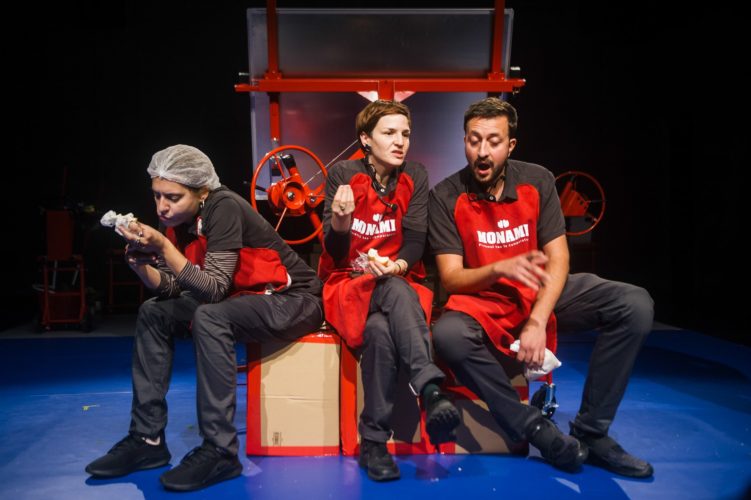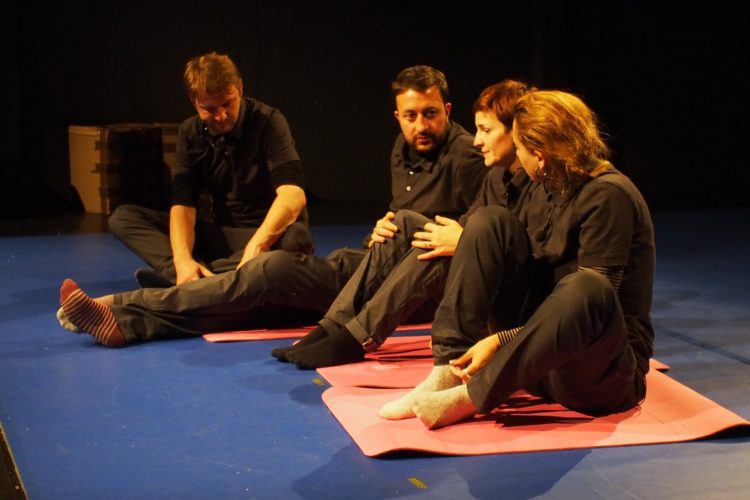Universal worker, the last play by the one of the most intriguing theater directors working in Romania, David Schwartz, is – perhaps not surprisingly – about how you choke and scream in capitalism. In this review, I want to discuss how this play suggests a crisis about political theater. Located at the intersection of performance, avant-garde theater, and an ethnography of marginality, Romanian political theater has become a key actor in generating discussions about revolutionary change. Here I explore how and why this theater may need to rethink its aesthetic and intervention in real time.
So, what crisis am I talking about?
The promise of an engaged theater is that it offers an anti-capitalist imaginary under conditions of deep exploitation. To get to its promise, this genre has to work with a constitutive tension: on the one hand, it seeks to represent the experiences of a marginalized group (in this case, the workers in corporate market stores), and on the other, to transform and offer them a revolutionary orientation. From the theorization of “Leftist counterpropaganda” (David Schwartz) to “the transformative potential of documentation” (Mihaela Mihailov), political theater has articulated an aesthetic that seeks to not only represent, but to change reality.[1] But the reality at stake is here and now, and this play is deeply anchored in the on-going discipline that workers face under corporate management.
To name the present that the play talks about, Mark Fisher has invented the term capitalist realism. The term does a lot of good things: for instance, it names a politics and an aesthetic of lacking. If you live in the new capitalism, you’re permanently substandard and do not match the impossible to fulfil norms of the capital. But the term also points to something else, and here is the catch: managers and workers now share a common attitude, that is, they are critical and hostile with regard to bosses and hierarchy, but they are perfectly willing to comply with the program. Class conflict disappears as long as hostility will channel itself in their criticism and disappointment towards their colleagues and peers.
I will say it again, because Fisher’s observation helps us identify a central problem of political theater. The aesthetics, but also the crisis of political action in Universal Worker, derive from capitalist realism. Both emerge from the language and behavior of corporate interactions, from small solidarity talks during breaks, from destroying traditional forms of oppositions such as unions, from the failure of individual resistance, from the hopes that some put into a promotion or emigration. Everything functions in capitalist realism because the anger against exploitation does not translate in the reality of resistant bodies. Bodies could become workers either when they fight injustice or when they organize to get out from the logic of administrative hierarchy, but they don’t.
Why is the play important in the Romanian context?
Firstly, Universal Worker clarifies a problem for the Left’s imagination, that is, workers are not tovarăși (comrades). The working class is already oriented to capital, so they also dream of vacations in Turkey, to make more money, or a promotion to office jobs. Tovărășia (comradeship) is a difficult dream to achieve, and it gets easily undermined in the face of capital’s power. For the director, however, political theater is not only about experiences in realist capitalism, but primarily about the effort to mobilize from a revolutionary standpoint. Here is where what-could-be-different can show up: a revolutionary orientation transforms humiliation into a fantasy of revenge. Or, in a different scenario, the play suggests that one can go into strike and could feel empowered and have some sort of agency (see Maria Sgârcitu’s wonderful music). The director wants to make an intervention at this level: anti-capitalist organization is possible, but it is blocked, and the play seems to say that resistance is useless at this stage.
Secondly, Universal Worker indirectly talks about the problem of tovărașia on the Leftist scene. The play shows that the hostility against those who are close to you does not happen only in factory or corporation, but also in the world of the Left where the other is wrong. Yes, the other person does wrong, but isn’t the problem the expectation that the other is some sort of an ally due to their class, race, or queer position? Shouldn’t we abandon the expectation that Leftist solidarity should exist because of given positionality?
If solidarity based on certain expectations does not work, as the play shows, perhaps Brecht can offer us a solution to this predicament. I wonder, what if we choose a different imagination for revolutionary possibilities, like the way we would elect a new people?
Here is how one can find new tovarași.
First, the new tovarăș is not the leftist, but the agitator. They, the agitators, do not have the experience of capitalist realism, but that of a revolutionary practice. In other words, the workers that political theater looks for are not the workers from here and now, those who only feel exploitation, but those who have a history and a desire for an equal world, of fuller social relations with pleasure and better sex. They, the agitators, try to mobilize others, and constitute a starting point to look for new forms of politics. This is what the director does with the character of the union leader (who is exceptionally played by Andrei Șerban), who is the only one who has lived and embodied the history of refusing corporate discipline, although he is designed to fail. He fails because his expectations lead him to defeat and is associated with a certain corporeal performativity. Even if the union leader has traces of a socialist utopia in his language, which is different from younger employees (such as the IT person, played with nuance by Alexandru Potocean or the young female who does not understand the role of a union, very well played by Alice Marinescu), he looks just like everyone else. But the figure of the agitator is one that needs to contain the traces of the past, not only in their clothes, for example, but also in the intelligence of anticipating capital movements. Ultimately, the agitators are the ones who survive knowing that they will be in permanent danger of being thrown out, and David Schwartz knows best that they are also very skilled at working with the adversity of the system in which they are placed. The agitator is perhaps most effective when he does not necessarily succeed in transforming the system, as much as surviving and sketching an ideological field that becomes the problem of managers.
Who are the new tovarași in realist capitalism? The second tovarăș is the object that has a memory of resistance to capital. A serious problem in the play is that the objects are already commodities, same with human beings, so capitalist realism seems to be the only world here and now. This is why the Soviet constructivists’ tactics in the 1920s of producing comrade-objects are important for imagining a new world. In the play, an object-tovarăș is the slow motion eating of a jar of zacusca during lunch breaks. That may be the aura that comes from state-socialism. Katia Pascariu subtly plays a worker that lived in the time before 1989, and she carefully eats her food. The zacusca jar is a tovarăș because it suggests an affective relation with a world where people were producers of their own food, a world in danger of becoming extinct, because it is not appropriated by the upper-class interested in organic food and slow eating. The zacusca jar is a tovarăș for Pascariu’s character because she comes in contact with a world that is still alive, one that is not just a seller of other people’s commodities. If people are already realists and capitalists, the zacusca jar has an affective relation with a world that refuses to leave. Zacusca is an object-tovaraș that keeps the character alive, and we should not underestimate its witchy powers.
But the most important tovarăș to be found is the visceral reaction to the play, which can move beyond kill joy (a favorite for queer anti-relational theorists such as Sara Ahmed) or the experience of empathizing with the exploited. I came out of the show surprised that the laughter had me in tears from a horror situation. I felt confused, bewildered, dissociated that I live in capitalist realism.
Yes, yes, and yes, the experience of the affective hammer can have revolutionary potential. Another special play by the same director, What would we be if we would know (2016), was for some people a wake-up call. They understood that they are not alone and that were others before them that fought to live a better life. But Universal Worker seems to move in the direction of accelerating anxiety, or rather the fear that you are alone. What it does is it places horror at the center of the public’s experience, particularly when you maniacally laugh when the situation stinks. Perhaps the fact that Macaz COOP is searching for a new space — and anxieties related to this unstable position — is a feeling directly linked to the play’s intervention, of the horrific hammer that it deploys.[2] But I would have liked a tighter connection to the feeling of hope from What would we be if we would know, one that produces a new imagination where the affect generates the desire that another world is possible.
If the future is neither in another world nor in the here-and-now of capitalist realism, it is located in the effort to become tovarăș with those who fight for survival, who agitate and put their bodies on the line. And the efforts, perhaps because they are temporary and awkward, are everywhere, because reality is communist and is produced by people constantly. In making friends with agitators, in the slow move to eat zacusca, in the relation with the object-tovarăș, one can find new possibilities that can be better explored. What Katia Pascariu did was to open a new world that suggested a break from the burning question of “what is to be done”. It opened a space for reflection that connected us viscerally to a potential that is still unfulfilled. And perhaps if Alice Marinescu’s character changes gradually and sees that the corporate world is a trap, the anti-capitalist future is here.[3] Becoming tovarăș with new objects and desires has arrived, but it is work without any guarantees.
My initial question was whether political theater must be anchored to that extent to capitalist realism. What I suggest is that one can find new tovarăși and relations that move beyond the traditional imagination about the working class. Political theater can change its imagination about intervening in real time if it sees the affective utopia as a location to explore. The horrific hammer in Universal Worker is a way to wake up and hope again, but the impulse to dream and find the potential of resistance in history needs to be re-articulated. Perhaps a production of other visceral reactions, in the vicinity of hope, is to be desired, and political theater should not be afraid of embracing other aesthetic possibilities.
Universal Worker
With: Alice Monica Marinescu, Katia Pascariu, Alexandru Potocean, Andrei Șerban
Production designer: Irina Gâdiuță
Music and lyrics: Maria Sgârcitu
Choreography: Carmen Coțofană
Visual identity: Cătălin Rulea
Director și playwriter: David Schwartz
Research: Veronica Lazăr, Alice Monica Marinescu, Rodica Novac, Katia Pascariu, Alexandru Potocean, David Schwartz, Andrei Șerban, Andra Tarara
Media Partners: Federația Sindicatelor din Comerț, Friedrich Ebert Stiftung, Asociația Conect, Centrul de Teatru Educațional Replika
[1] See Teatru politic.2009-2017 (Tact, 2017) and introductory texts by David Schwartz și Mihaela Mihailov.
[2] Macaz COOP is a major Leftist political space independently run in Bucharest, Romania, and political theater had one of its stronger supporters in this organization. It will open soon in a new location.
[3] David Schwartz made this observation in our email conversation.
POSTED BY
Andrea Gorzo
Andrea Gorzo is a prominent art critic who won multiple awards at big international festivals. She is a passionate gardner and a huge fan of exotic films....








Comments are closed here.